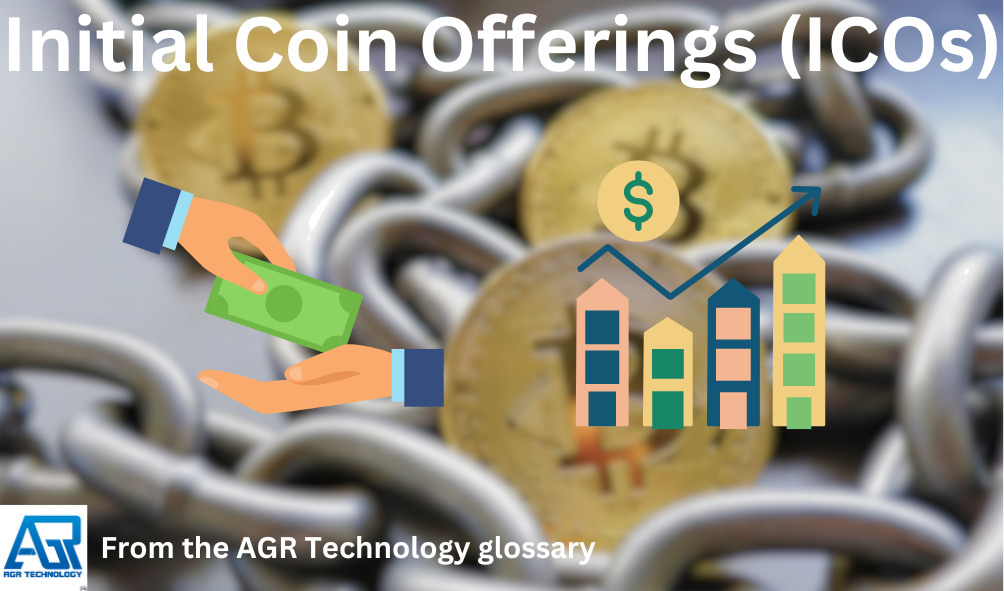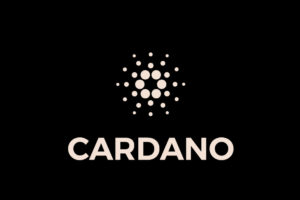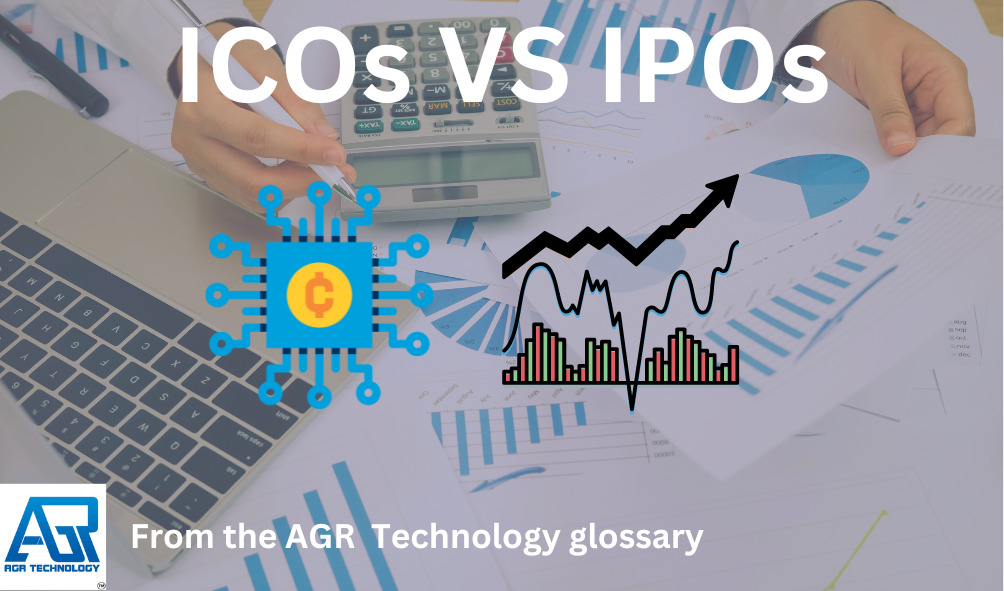Introduction

An Initial Coin Offering or ICO for short is a type of cryptocurrency funding mechanism that acts similar to an Initial Public Offering similar to a public company but through a decentralized blockchain. Although a private ICO that does not seek public investment is also conceivable, it is frequently a sort of crowdsourcing. In an ICO, a certain amount of stable cryptocurrencies are offered as “tokens” to investors or traders in return for fiat money or other cryptocurrencies.
If or when the project is successfully launched and the ICO’s financing target is reached, the tokens are marketed as future useful units of currency. ICOs have been used as a means of scams and fraud, and they may violate existing laws or be outright prohibited in some places. From January to June 2018, a record $7 billion was raised via ICOs as the technology has been embraced more and used across different projects in the DeFi space.
In addition to buying Cryptocurrency assets, many exchanges also have the functionality to participate in ICOs. We have covered different exchanges in various blog posts such as Best Crypto exchanges in Australia, Top NZ Crypto Exchanges, Quality & regulated Exchanges that work in Dubai, some of the best exchanges to buy and sell Crypto in Norway, some of the leading Crypto exchanges for Taiwan and our free online tool to help you find the best Cryptocurrencies to buy and invest in based on market data.
How do they work?
:max_bytes(150000):strip_icc()/dotdash_Final_Initial_Coin_OfferingICO_2020-01-eaa6d7c8f6394ae08a67ccc809462e4d.jpg)
Video summary that explains how ICOs work in a simple way:
Example ICOs and their use-cases

Over the years there have been countless ICO projects that have launched here are some notable examples of ICO launches and what the projects set out to accomplish.
Ethereum itself
![]()
The Ethereum Cryptocurrency project itself started out with the goal of creating an alternative to Bitcoin that had larger “blocks” on its blockchain and more functionality. Ethereum is a software-based open-source blockchain system. Vitalik Buterin, a software developer, presented the idea back in 2013, and Ethereum debuted in 2015 via an ICO that was very successful.
It eventually raised $18.4 million which helped it explode in popularity due to its programmable blockchain now making it the second largest Cryptocurrency only behind Bitcoin at the time of writing.
Ethereum has also become very popular with developers for use in DApp or DeFi projects such as smart contracts and other financial applications that make use of its versatile foundation.
Telegram

Telegram is a popular instant messaging platform very similar to Whatsapp launched by Russian entrepreneur Pavel Durov who also founded the Russian social network VK (Vkontakte).
According to documents submitted to the Securities and Exchange Commission (SEC) in 2018 a British Virgin Islands-based company used by Telegram reported raising $850 million in March and $850 million in February. Starting on March 14, 94 investors took part in the ICO. 81 investors participated in the initial investment round from January 29 to February 13.
Dragon Coins

Dragon Coins was a failed ICO project started by a Casino group and was subsequently sued in the US by the SEC. Prior to collapsing $320 million was raised in March 2018, but a series of controversies led to a sharp decline in its price upon public trading. By 2021, its market capitalization had dropped below $1 million.
Cardano

ICOs are unregulated and do not provide investor confirmation or protection. IPOs are typically supported by institutional investors, whereas ICOs are mostly supported by local financiers. When launching an ICO, there are few requirements to meet, making it difficult for investors to make a solid financial investment decision.
Cardano was first made available to the public in 2017. The Blockchain Technology Laboratory was launched by IOHK in collaboration with the University of Edinburgh.
In May 2021, Cardano had a market worth of $77 billion, the fourth highest for a cryptocurrency at the moment. Cardano was ranked 26th for brand intimacy out of 600 brands by advertising agency MBLM in August 2022, between Ford and Nestlé, and the highest rank for a cryptocurrency.
Pros & Cons of the technology
ICOs, like any other investment opportunity, have pros and risks. Here is a full overview of the advantages and disadvantages of Initial Coin Offerings:
Pros:
Access to funds:
Initial coin offerings (ICOs) let startups and small businesses raise funds without going through traditional fundraising channels such as venture capitalists or angel investors. This implies that businesses that have previously struggled to acquire funding now have access to a new source of capital.
Potential for huge returns:
One of the key benefits of ICOs is the possibility of huge returns. Early investors in successful ICOs have witnessed returns of 1000% or more, making it an appealing investment option for those prepared to face a high level of risk.
Liquidity:
In general, cryptocurrencies are more liquid than traditional investments. This means that investors can acquire and sell tokens more readily and fast than traditional investments allow.
Transparency:
The blockchain technology that underpins the majority of ICOs is extremely transparent. This implies that investors may watch the passage of their cash and observe how the firm or organization is using them.
Cons:
Higher risk:
ICOs are regarded as high-risk investments. Many ICOs fail, and investors may lose their whole investment if the firm or organization sponsoring the ICO fails.
Lack of Regulation:
Because ICOs are mainly unregulated, investors have few options if something goes wrong. There have been reports of fraud and fraud in the ICO sector, thus investors should proceed with caution when considering investing in an ICO.
Volatility:
Cryptocurrencies are highly volatile, with token values fluctuating fast. This makes predicting the value of an investment challenging for investors and can result in severe losses.
Limited Acceptance:
Because cryptocurrency is still not commonly recognized as a form of payment, investors may have limited alternatives for utilizing their tokens.
Investing in ICOs necessitates a certain level of technical understanding since investors must understand blockchain technology and how it works. For some investors who are unfamiliar with the technology, this can be a barrier to entry.
Regulatory And Market Challenges Of Initial Coin Offerings – How they compare with Traditional IPOs

ICOs are not regulated and have no investor confirmation or protection; IPOs are generally supported by institutional investors and heavily scrutinized, whereas ICOs are mainly supported by individuals or groups of online communities. As there are minimal requirements to satisfy when starting an ICO, it is really tough for an investor to necessarily make sound decisions and due diligence.
Sometimes one is merely purchasing an idea without tangible preparation for implementation or just relying on YouTube videos as their due diligence. As a result, the company holding the ICO will get the bulk of the financial investments at the very start and as there is little to no liability, there is basically no pressure to in fact provide anything of value.
This is why when it comes to ICOs and other types of investments extensive due diligence is key and understanding what it is you are investing in is very important.
Some background history on ICOs

Mastercoin staged the first token sale (often referred to as an ICO) in July 2013, while Ethereum raised money through a token sale in 2014. In 2017, ICOs and token sales gained popularity; by the middle of the year, at least 18 websites were tracking ICOs. A new web browser named Brave’s May ICO raised $35 million in less than 30 seconds, and the messaging app maker Kik’s ICO in September 2017 raised about $100 million.
By November 2017, there were almost 50 offers each month, with Filecoin raising $257 million as the highest-earning ICO as of January 2018. Although ICOs raised less than 2% of the capital raised by IPOs at the end of 2017, they had nearly raised 40 times as much money as they had in 2016.
An innovative alternative to an ICO for funding cryptocurrency ventures is an initial stake-pool offering (ISPO). In an ISPO, participants stake their cryptocurrency holdings (mainly ADA) through a stake pool run by the cryptocurrency project in exchange for 0.065 $MELD for every $ADA they stake while maintaining full control of their cryptocurrency.
Mastercoin staged the first token sale (often referred to as an ICO) in July 2013, while Ethereum raised money through a token sale in 2014. In 2017, ICOs and token sales gained popularity; by the middle of the year, at least 18 websites were tracking ICOs. A new web browser named Brave’s May ICO raised $35 million in less than 30 seconds, and the messaging app maker Kik’s ICO in September 2017 raised about $100 million. By November 2017, there were almost 50 offers each month, with Filecoin raising $257 million as the highest-earning ICO as of January 2018.
Although ICOs raised less than 2% of the capital raised by IPOs at the end of 2017, they had nearly raised 40 times as much money as they had in 2016. An innovative alternative to an ICO for funding cryptocurrency ventures is an initial stake-pool offering (ISPO). In an ISPO, participants stake their cryptocurrency holdings (mainly ADA) through a stake pool run by the cryptocurrency project in exchange for 0.065 $MELD for every $ADA they stake while maintaining full control of their cryptocurrency.
FAQ on the topic:
Is an initial coin offering (ICO) legal?
What happens after the initial coin offering?
What is the largest ICO in history?
Can anyone invest in an ICO?
Conclusion
In conclusion, ICOs have the potential to provide startups and small businesses with access to capital and offer investors the potential for high returns.
However, they are also high-risk investments that lack regulation and can be highly volatile. Like all types of assets, it’s important for investors to carefully weigh up the pros and cons before deciding whether to invest in an ICO.
Be sure to check out our blog for more crypto-related content as well as the links below for other related terms on our glossary.
Related content from our website:
What are Initial Exchange Offerings (IEOs)
How Cryptography works and makes Cryptocurrencies possible
What is a distributed ledger and how does it work?
Financial services SEO and digital services
Central Bank Digital Currencies
What is market analysis in the context of Cryptocurrencies?
What is Know Your Customer (KYC)?
Guide to choosing quality CFD trading/investment software in Dubai
Key companies and figures in the Crypto sector
Summary of top Australian loan providers & apps
What are Privacy Coins and how do they work?
Curated summary of the “best crypto exchanges in Hong Kong”
Blockchain Explorer Definition
List of platforms to help you accept Cryptocurrency payments on your website
Curated summary of some of the best Cryptocurrency apps & platforms for Singapore users
Net worth calculator – online tool
Mortgage affordability calculator – online tool
Some of the best CFD brokers in Australia (including options for beginners)
Top-rated Cryptocurrency exchanges & applications for India
Crypto exchanges for South Africans
Web3 Software Development Services
NFT Digital Marketing Services
(Tutorial) How to buy Cryptocurrency in Australia
Platforms to earn interest on your Cryptocurrency assets
How to buy Bitcoin or other Cryptocurrency assets online
Top stock market trading platforms Australia
How to pay overseas staff from Australia online
Guide to buying Etherium (Eth) in Australia
Some of the top-rated Cryptocurrency exchanges & apps for Saudi Arabia
Some leading best small business loan/financing providers for Perth businesses
Top-rated Alternatives to Etoro for Australian CFD traders
Top Alternatives to Swyftx for Australian Crypto users
Some of the best Cryptocurrency exchanges/apps for Canadians
Different commercial loan brokers for Melbourne businesses
Collection of some of the best day trading platforms for Australians
ICO Marketing Solutions to help brands capture more online reach
CMC Markets Alternatives for Australian end-users wanting to start trading
Commercial loan brokers & platforms for Sydney businesses – curated list of providers
Coinspot alternatives platforms Australians wanting to get started with Cryptocurrencies
Services to help you recover lost Crypto from your devices
List of some top Etoro alternatives for Australian forex traders
What to look for when choosing a neobank app
Web3 Marketing Services By AGR Technology to help brands reach more users
Source(s) cited from our research:
“Bloomberg” www.bloomberg.com/news/articles/2018-08-02/crypto-bulls-pile-into-icos-at-record-pace-despite-bitcoin-rout. Accessed 15 Apr. 2023.
Initial coin offering. Wikipedia. https://en.wikipedia.org/wiki/Initial_coin_offering. Published March 8, 2017. Accessed April 15, 2023.
Bloomberg https://www.bloomberg.com/news/articles/2017-07-25/bankers-ditch-fat-salaries-to-chase-digital-currency-riches.
“File:ICO security.png.” Wikimedia Commons. September 12, 2017. Accessed April 15, 2023. https://commons.wikimedia.org/wiki/File:ICO_security.png.
www.investopedia.com/thmb/MHd2hc_rNNGolhLY7zSW92_dObE=/750×0/filters:no_upscale():max_bytes(150000)-
:strip_icc():format(webp)/dotdash_Final_Initial_Coin_OfferingICO_2020-01-f7519afb7b28440fb0250cbbf51a74d0.jpg. Accessed 17 Apr. 2023.
Accessed April 17, 2023. https://images.pexels.com/photos/844125/pexels-photo-844125.jpeg?auto=compress&cs=tinysrgb&w=1260&h=750&dpr=1.
(2013, December 30). Telegram (software). Wikipedia. https://en.wikipedia.org/wiki/Telegram_(software)
Full Bio, Telegram’s Initial Coin Offering Raises $1.7B, (Mar. 30, 2018), https://www.investopedia.com/news/telegrams-initial-coin-offering-raises-17b/.
Nelson, Jason. “SEC Sues Dragonchain for $16.5 Million Dragon Token ICO” Decrypt, 16 Aug. 2022, decrypt.co/107567/securities-and-exchange-commission-sues-dragonchain-for-16-5-million-ico. Accessed 17 Apr. 2023.
“WhitePaper ver2.0 19DEC” 19 Dec. 2017, s3.amazonaws.com/drg-token/s3.amazonaws.com/drg-token/Whitepaper-Dragon.pdf. Accessed 17 Apr. 2023.
Lyle Daly, What Is an Initial Coin Offering (ICO)?, The Motley Fool https://www.fool.com/investing/stock-market/market-sectors/financials/cryptocurrency-stocks/initial-coin-offering/.
“Cardano (blockchain platform)”, Wikipedia. 19-Jan.-2017. [Online]. Available: https://en.wikipedia.org/wiki/Cardano_(blockchain_platform). [Accessed: 19-Apr.-2023].
![logo-new-23[1] logo-new-23[1]](https://agrtech.com.au/wp-content/uploads/elementor/thumbs/logo-new-231-qad2sqbr9f0wlvza81xod18hkirbk9apc0elfhpco4.png)